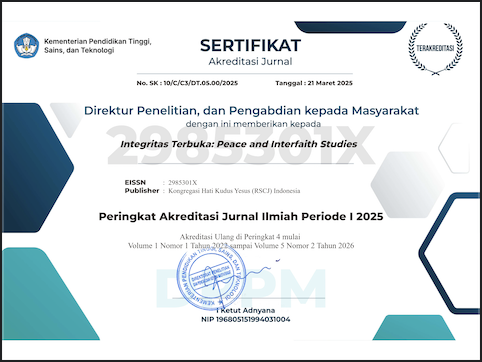Critique of the Double Standards of the Education System
Analysis of Paulo Freire's Thoughts on the Practice of Implementing the Education System in Indonesia
DOI:
https://doi.org/10.59029/int.v3i2.39Keywords:
Pendidikan, Paulo Freire, Pendidikan pembebasan, Kesadaran kritisAbstract
Education is a complex and broad topic that involves various concepts, theories, and methods of analysis. Discussions on education are not limited to the teaching and learning processes; they also encompass philosophical issues and policies that are often opaque. The processes of refinement and transformation in education are ongoing, making it a continually engaging topic for discussion. Education plays a crucial role in uniting diverse communities and serves as a powerful tool for the state in building human resources. However, the main challenge lies in determining the appropriate curriculum, considering the complexity and multitude of factors affecting the educational system. This study employs an inductive method to address educational issues in Indonesia by examining the curriculum through the lens of Paulo Freire. By referencing his book Pedagogy of the Oppressed, this research aims to identify the concept of "ideal educational practice" in relation to liberating education. It utilizes both primary and secondary sources to understand the critiques and applications of education in Indonesia. The study analyzes Freire's thoughts and their connection to curriculum practices, culminating in fundamental questions regarding ideal education and the complexities faced. The findings will be presented in a descriptive analysis format, providing a comprehensive overview of educational problems. According to Freire, the domination of power creates oppressive education, contradicting the aims of liberating education. Education should cultivate individual awareness as part of a community, fostering responsibility and contributions to the common good. Educational institutions need to balance the vision of achievement with the mission of student development. All stakeholders—institutions, teachers, and students—must focus on meaningful educational objectives to create a quality educational system.
References
Bahri, Syamsul. “Pengembangan Kurikulum Dasar Dan Tujuannya.” Jurnal Ilmiah Islam Futura 11, no. 1 (2017): 15.
Freire, Paulo. Pedagogy of the Oppressed. The Community Performance Reader. New York: Continuum, 2005.
Freire, Paulo, and Colonized Brazil. “Paulo Freire (1921—1997).” Internet Encyclopedia of Philosophy, 1997, 1–28.
Gultom, Maidin. Perlindungan Hukum Terhadap Anak Dan Perempuan. 5th ed. Bandung: Refika Aditama, 2022.
Jaeger, Werner. Paideia: The Ideals of Greek Culture (Vol III): The Conflict of Cultural Ideals in the Age of Plato. Vol. 3. New York: Oxford University Press, 1986.
Needham, Paul, Michael Weisberg, and Robin Hendry. “Philosophy of Education.” Stanford Encyclopedia of Philosophy, 2011.
Norman, Richard. On Humanism. London: Routledge, 2004.
Nur, Askar. “Kapitalisme Pendidikan Dan Reinventing Paradigma Pendidikan Indonesia.” Al-Ubudiyah: Jurnal Pendidikan Dan Studi Islam 3, no. 1 (2022): 69–84.
siva.kemenperin.go.id. “Mengenal Pendidikan Sistem Ganda,” Jakarta Selatan, September 2021.
Sugiharto, Bambang. Kebudayaan Dan Kondisi Posr-Tradisi. Edited by Rian Wahyudi. 5th ed. Daerah Istimewa Yogyakarta: Kanisius, 2023.
Sugiharto, Bambang, Bartolomeus Samho, Stefanus Djunatan, Johanes Wisok, Andreas Doweng Bolo, Darius Djehanih, Hendrikus Endar, et al. Humanisme Dan Humaniora. Edited by Bambang Sugiharto. 2nd ed. Bandung: Pustaka Matahari, 2008.
UU NO. 2 Tahun 1989 Tentang Sistem Pendidikan Nasional. Dewan Perwakilan Rakyat Indonesia. Vol. 58, 1989.
Downloads
Published
Issue
Section
License
Copyright (c) 2024 Benediktus Hasiholan Gultom

This work is licensed under a Creative Commons Attribution-ShareAlike 4.0 International License.
Attribution-ShareAlike 4.0 International (CC BY-SA 4.0)
You are free to:
Share - copy, and redistribute the material in any medium or format.
Adapt — remix, transform, and build upon the material for any purpose, even commercially. The licensor cannot revoke these freedoms as long as you follow the license terms.
Under the following terms:
Attribution — You must give appropriate credit, provide a link to the license, and indicate if changes were made. You may do so in any reasonable manner, but not in any way that suggests the licensor endorses you or your use.
ShareAlike — If you remix, transform, or build upon the material, you must distribute your contributions under the same license as the original.
This license is acceptable for Free Cultural Works - https://creativecommons.org/licenses/by-sa/4.0/


















